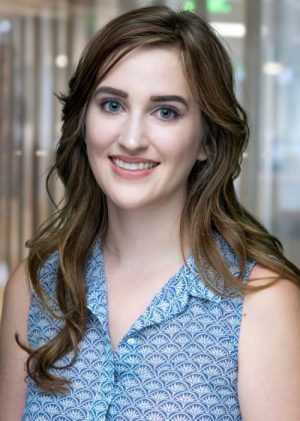Shawn Gessay graduated in 2013 with a double major in Art & Art History and Neuroscience. At Dickinson she took three semesters of Russian, lived in the Russian House, and was an active member of the Russian Club.
What does a genetic counselor do?
Clinical genetic counselors are allied healthcare members who perform a genetic risk assessment on patients who might be concerning for an inherited disease, and this can span across multiple subspecialties: obstetrics, pediatrics, oncology, and neurology, to name a few. Some genetic counselors choose to work in lab settings and guide providers on appropriate genetic test ordering, and provide a consultative service to help interpret difficult results. I work at a large academic health setting, and my day-to-day looks different every week! I see adult under- or unfunded patients along the south Texas border through telemedicine clinics or in-person encounters that take place in those border towns; I also see adult neurology patients who have concerning cognitive or movement disorders; and, I see pediatric patients who are affected or at risk for oncological or hematological conditions.
Why did you decide to take Russian at Dickinson?
I’ve always thought it was a beautiful language, and I was really interested in the culture. There were quite a few Russian writers, poets, and artists that I loved in high school and I think that’s probably what first piqued my interest.
What did your path look like after graduation?
One of my professors at Dickinson was the first person to introduce me to the field, and I was always interested in one day pursuing that path. That said, after I graduated, I felt like I needed a break from the rigors of academia and moved to New York City, where I worked as an office manager for a busy Ob/Gyn practice. At the same time, I shadowed genetic counselors in my area to make sure that this really was what I wanted to do, and I volunteered at crisis hotlines, cancer advocacy locations, and with rare disease groups to round out my experience.
What do you remember most about the three semesters you spent studying Russian?
I obviously learned a lot from my coursework, but what I really loved were the opportunities I found outside of the classroom: Russian dinners on Tuesdays, film nights, and living in the Russian house, to name a few. To this day, I still make my friends watch the youth KGB classroom scene from Stilyagi and nobody can tell me that that isn’t one of the most powerful moments in film, ever.
How has your study of the humanities (language) and the arts (studio arts concentration) enriched your life and your professional practice?
A lot of my colleagues (good-naturedly) laugh about my studio art background, but it’s been really useful in my career! I am a content consultant for a genetics company and my role is to create graphics that communicate complicated molecular concepts. It’s also incredibly useful to be able to draw quick sketches of information I’m trying to communicate to patients that just isn’t landing for them. In regards to language abilities, I work with a primarily LatinX population and my Spanish leaves a LOT to be desired. Learning a new language teaches you humility, and how to overcome some of those communication barriers. Although I don’t get to use my Russian language skills directly, I think indirectly it has helped me to better understand the experience of non-native speakers and to be very patient in those discussions (also, visuals really help with that, as well).
What would you say to current student who do not yet have a firm idea of their ideal career field?
I think one of the biggest challenges for me as a student was trying to find career paths that directly aligned with my areas of study, and I would encourage you to explore professions that maybe fall outside that box. Your college education teaches you skills that will serve you well in many facets of your life, and if you don’t end up using your biochem or Russian degree in your professional role, that’s ok! Having those quantitative reasoning skills or cultural sensitivity is going to make you a huge asset to any employer, and you may find that your career narrative takes you in a direction that you never expected.
